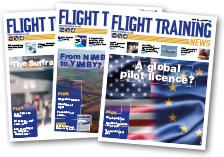Act now….! Is the advice to pilots, instructors and examiners from the UK CAA’s former Head of Licensing and Training Policy, Cliff Whittaker, who outlines how to avoid the negative implications of a potential “hard Brexit”, and the effects the divorce could have on your licence.
It is clearly stated on the CAA website that the CAA and DfT are firmly of the view that the CAA should remain a Competent Authority within the European regulatory system when the UK is outside the EU, (similar to Norway, Iceland, Switzerland and Liechtenstein).
If that objective is achieved the effects on UK aviation organisations and UK licensed personnel will be minimal; but that outcome will require a formal agreement to be in force between the UK and the EU on 30th March 2019. The current general political situation indicates that there is a significant risk of a so-called “no deal Brexit”, which could mean the UK leaving the EASA system.
Cliff Whittaker lists the potential scenarios for a “hard Brexit” to pilots holding the following licences, and what they should do.
Commercial Pilots
If there is no formal agreement in place to remain within the EASA system all UK-licensed pilots will lose their privileges to fly aircraft registered in the EASA Member States on 29th March 2019.
Thus, one clear implication of a hard Brexit is that any UK-licensed pilot who is employed by an airline based in mainland Europe is at risk of losing his/her job at the end of March unless they ensure that their licence is reissued by another Member State before Brexit day.
Pilots employed by airlines based in the UK should be okay because their newly national licences will be valid for their employers’ UK-registered aircraft.
However, they will subsequently find it more difficult to leave their current employer to take a job with a European carrier as they will need a European licence or a European validation of their UK national licence to do that.
So how hard would it be to convert a ‘UK-FCL’ national licence to a European licence following a hard Brexit?
If the UK leaves the EASA system, the licences administered by the CAA will be 3rd country licences and so UK pilots will be subject to the validation and conversion rules set out in the European Aircrew Regulation.
Complying with the requirements for licence conversion is onerous, it takes about 2 years and is expensive. This is mainly because the requirements for licence conversion include the demonstration of technical knowledge, which means that an existing CPL or ATPL holder will have to take and pass again all of the relevant theoretical knowledge examinations with an EASA Member State authority.
Also, there are minimum Pilot-In-Command flying hours requirements for licence conversion. Applicants will have to obtain a new Medical Certificate from the Member State that will issue their licence and pass the appropriate skill test with a European examiner.
So what about the licence validation option?
The EU rules for the validation of 3rd country licences are very restrictive and lead directly to the licence conversion procedure outlined above. The fundamental rule is that an individual licence holder can only ever have one validation. No repeat applications are permitted.
The maximum duration of a validation is one year; except that it can be extended once before expiry if the pilot can show he/she is making efforts to complete a licence conversion; in which case the authority that issued the validation can extend it by a period they consider adequate to complete licence conversion. (Extension of a validation beyond one year is likely to be dependent on the pilot having passed some of the theoretical knowledge exams).
For these temporary validations pilots must also obtain a European Medical Certificate and pass the appropriate skill test with a European examiner.
If you have any intention of flying an aircraft registered in the EU after March 2019, you have the following options pre-Brexit:
1. apply to another Member State to have your licence re-issued by them – and get your new licence before the end of March; or
2. do nothing and bank on the UK remaining within the EASA system so that you retain European licence privileges.
If you go for option 1 your new licence will be valid for aircraft registered in EASA Member States and in the UK. If you go for option 2 but the UK does leave the EASA system you will lose your European licence privileges.
If you subsequently need a European licence, you will have to re-take your theoretical knowledge examinations and comply with the other conversion requirements to get a licence that has the same privileges that you have today.
Please be clear that the option of simply having your existing licence re-issued by another Member State will cease as soon as the UK leaves the EASA system – if that is an outcome of Brexit.
There is also a potential trap here for UK-licensed pilots flying for British airlines. If the UK leaves EASA, all UK-licensed pilots will have national licences and their continued employment with their existing UK employers should not be affected.
But what if, post-Brexit, a UK airline decides to re-locate its Principal Place of Business to Europe in order to restore access to EU routes?
The company will then be a European operator and under EU law the pilots flying for that operator will then have to obtain European licences by complying with the conversion requirements (and probably validations for short-term continuity of employment) even if the aircraft remain registered in the UK.
Private Pilots
The information given above regarding commercial pilots also applies to the holders of PPLs, although the adverse consequences are less severe.
The cheapest and least onerous option for retaining European privileges (as well as UK privileges) is a licence transfer to another Member State before Brexit.
For UK pilots holding LAPLs, transfer to another State before Brexit may be the only way to have European privileges in the future. As the LAPL is a sub-ICAO licence there are no existing validation or conversion options in the EASA rules for national equivalents of these licences.
Instructors
Instructors should note that if the UK leaves the EASA regulatory system their privileges will only be valid for UK national pilot training, (including for the UK former Part-FCL licences which will become national).
Anyone who intends to give instruction for a European Part-FCL licence or rating after 29th March 2019 will have to continue to hold a Part-FCL instructor rating issued by an EASA Competent Authority.
Instructors can ensure that they can continue to instruct for Part-FCL licences and ratings (and national UK licence privileges) without interruption, whatever the outcome of Brexit, by transferring their licences and all ratings to another Member State by the 29th March 2019.
Alternatively, instructors can apply to another Member State after Brexit for a 3rd country instructor certificate. This will authorise them to give training for Part-FCL licences and ratings outside of the territory of the EASA Member States.
Examiners
Anyone who intends to examine candidates for any European Part-FCL licence or rating after 29th March 2019 will have to continue to hold the appropriate Part-FCL examiner certificates issued by an EASA Member State.
Examiners can ensure that they can continue to examine for Part-FCL licences and ratings (and UK national licences and ratings) without interruption, whatever the outcome of Brexit, by transferring their licences, ratings and examiner certificates to another Member State by the 29th March 2019.
Alternatively, examiners can apply to another Member State after Brexit for a 3rd country examiner certificate. This will authorise them to test for Part-FCL licences and ratings outside of the territory of the EASA Member States. If the UK leaves the EASA system, examiners who have not had their certificates issued by an EASA Member State will be restricted to testing pilots for UK national licences and ratings.







